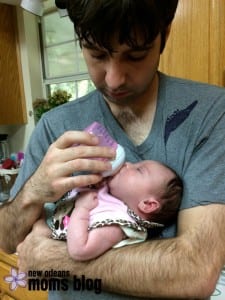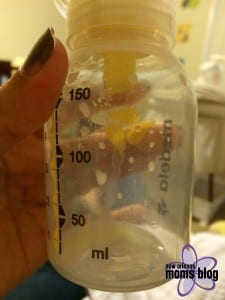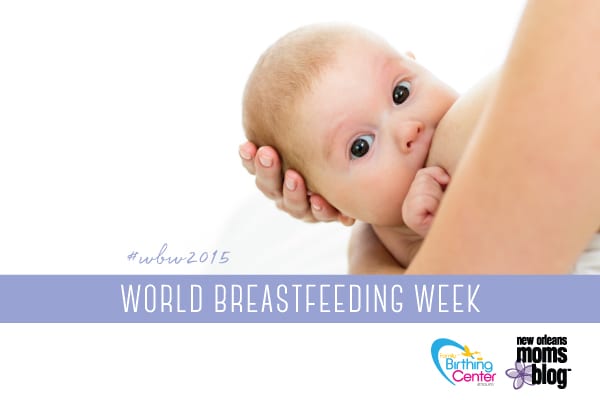Disclosure :: World Breastfeeding Week is recognized August 1-7, 2015. This year, World Breastfeeding Weekcalls for concerted global action to support women to combine breastfeeding and work. Whether a woman is working in the formal, non-formal or home setting, it is necessary that she is empowered in claiming her and her baby’s right to breastfeed. Our World Breastfeeding Week series is sponsored by Touro Infirmary.
When I found out I was pregnant, breastfeeding was a no brainer for me. I read the books, the blogs, the handouts, I’d even taken the classes. It’s easy, natural, what my body was designed to do. The message was loud and clear – breast is best – and my baby was going to get the best.
And then, she was born. I’d heard about the magical moment when you first latch your baby, how they naturally know just what to do and it’s this instant connection of the most primal form. Except Ruby didn’t seem to know what to do. And my flat nipples attached to F cups weren’t helping, even with the lactation consultant carefully assisting us. There, in the delivery room, just a few minutes after birthing this beautiful baby, armed with all the information in the world, I experienced my first “failure” as a mother. I couldn’t successfully nurse.
I refused to give up, attempting to nurse her around the clock in a variety of positions, locations, lighting schemes, anything. Breast was best, gosh darn it. We had a handful of successful sessions, but it was hard and they were few and far between.
 Looking back, I didn’t have a single lactation consultant stop by after my long nights struggling to feed her. When one did finally stop by, she left a nipple shield without fitting it or showing me how to use it. I didn’t see another lactation consultant until right before being discharged, when I was finally offered a pump. At that point, I was overwhelmed, frustrated, and feeling so unsupported. I just wanted to go home. It took me a long time to let go of my frustration and guilt that I hadn’t been more of an advocate for myself and my daughter. I should have been jumping up and down and pushing the call button repeatedly until they made a lactation consultant materialize. In the months following, I had to keep reminding myself to be gentle with me. I had just had a baby. Their job was to support me. It wasn’t my failure, it was theirs.
Looking back, I didn’t have a single lactation consultant stop by after my long nights struggling to feed her. When one did finally stop by, she left a nipple shield without fitting it or showing me how to use it. I didn’t see another lactation consultant until right before being discharged, when I was finally offered a pump. At that point, I was overwhelmed, frustrated, and feeling so unsupported. I just wanted to go home. It took me a long time to let go of my frustration and guilt that I hadn’t been more of an advocate for myself and my daughter. I should have been jumping up and down and pushing the call button repeatedly until they made a lactation consultant materialize. In the months following, I had to keep reminding myself to be gentle with me. I had just had a baby. Their job was to support me. It wasn’t my failure, it was theirs.
Ruby never successfully latched again after leaving the hospital. Not for  lack of trying, but it just wasn’t working. I attempted to call the hospital’s lactation consultants (no answer), reached out to friends, and started pumping religiously while trying not to get discouraged by the five or ten drops that finally came dripping out after 30 minutes attached to the pump. After hours of hungry screams and guilt and anguish, I cracked. There, in her nursery, I experienced my first selfless act as a mother. I gave her formula.
lack of trying, but it just wasn’t working. I attempted to call the hospital’s lactation consultants (no answer), reached out to friends, and started pumping religiously while trying not to get discouraged by the five or ten drops that finally came dripping out after 30 minutes attached to the pump. After hours of hungry screams and guilt and anguish, I cracked. There, in her nursery, I experienced my first selfless act as a mother. I gave her formula.
The next morning, I made an appointment to see the lactation consultant. I told her I was prepared to do anything. I’d already sent my husband off for every supplement under the sun and had basically attached myself to my pump. And here’s where I just about fell apart. The lactation consultant looked at me, a new and desperate mother, and told me that I had most likely ruined my chances of breastfeeding with that one formula bottle, so my only hope was exclusively pumping. And my milk would hopefully come in the next 48 hours, you know, if I hadn’t ruined it with that formula bottle. Again, looking back, I should have advocated for us. I should have demanded she watch me pump, watch her attempt to latch, do something more than tell me I had ruined my chances of a successful nursing relationship. But I felt deflated and sat in my car crying instead.
 Meanwhile, her pediatrician suspected a milk protein allergy based on the way that she was handling the formula, so she went on a special formula and I cut dairy out of my diet. No post-partum ice cream was rough, but I was desperate to do anything to keep the hopes of breastfeeding alive.
Meanwhile, her pediatrician suspected a milk protein allergy based on the way that she was handling the formula, so she went on a special formula and I cut dairy out of my diet. No post-partum ice cream was rough, but I was desperate to do anything to keep the hopes of breastfeeding alive.
My OB prescribed me a medication to increase milk supply. I saw some improvement and went from pumping an ounce per session on a good day (see picture to the right) to two or three ounces pretty consistently. I was thrilled that Ruby was getting 2-3 breastmilk bottles each day. I knew my dedication would pay off! Who needed sanity anyway? I was breastfeeding … kind of!
Cue the bloody, mucus-filled diarrhea and screaming. After a frantic trip to the pediatrician, we discovered that our baby was actually lactose intolerant. Yes, after all that work and lost sanity for eight weeks trying to produce enough milk to sustain her, she couldn’t tolerate my breastmilk anyway.
Postpartum hormones are a hell of a thing, because even knowing all of this, I still struggled to make peace with it. For weeks, I had been feeling guilty, inferior, miserable … and for what? My own ideas about what was best for my baby, informed by sanctimommies on the internet? My own desire to be a crunchy breastfeeding mom? I didn’t feel guilty and inferior anymore, but now I was angry at myself for putting my daughter through all of this because I didn’t want to be the mom at the play group pulling out formula.
Breast wasn’t best for my baby. And that’s okay. She’s now an amazing, smart, and silly toddler who isn’t on formula anymore anyway. It was a blip on the radar of her life. And as some mom on the internet told me, it’s not going on her college applications anyway.



















Thank you so much for sharing your story, Amy! It is extremely important that all moms share their feeding journeys so new moms struggling with some of the same issues don’t feel so alone. I know I felt alone when breastfeeding wasn’t going at all as planned! It takes courage to put yourself out there and hopefully your piece can help others realize that it’s okay. Formula is just fine and it’s such a small part of the puzzle! We are so hard on ourselves and parts of the system certainly don’t help, as your experience with the lactation consultant shows. Support is key, no matter what path you end up taking.
Support is definitely key, no matter what your choices are! I, too, hope that my story helps another mom make peace with her own feeding journey!
Terrific piece. Thoughtful, well-written, and on point.
Thanks!
I just wanted to say thank you for writing this piece. It is almost exactly the same as my story. (I will say that I did see several LCs in the hospital, but they often contradicted each other.) I was driving myself crazy trying to pump for just a little but of milk while also trying to take care of my son. I tried every supply booster and did get a Reglan prescription, but I was afraid to take it because of so many horror stories I read on the Internet about it causing depression. Anyway, it didn’t matter because a couple of weeks later we discovered my son’s milk allergy was worse than initially hoped, so my eliminating dairy and the Nutramigen weren’t cutting it. It finally took my son’s doctor telling me to stop pumping for me to justify doing it. He’s on EleCare now and doing great! I’ll admit, I still get sad from time-to-time that I can’t breastfeed, but I know I’m doing what’s best for my son.
Ashley, it sounds like we are basically breastfeeding twins! I’m sorry you had to go through the same struggles, but happy to hear he’s doing great! You are definitely doing what’s best and it’s frustrating when our emotions tell us otherwise!
As an IBCLC (International Board Certified Lactation Consultant) I am horrified to hear that na LC told you one bottle of formual would ruin breastfeeding. The first rule is “Feed the baby,” and Ruby needed to eat. That you were both discharged home with her not latching is inexcusable. I have not read any research supporting the lactose in breastmilk as the cause of blood in a baby’s stool. I have read protocols for “milk colitis” that associate bloody stool with dairy protein. Other foods may also play a part. https://www.bfmed.org/Media/Files/Protocols/Protocol24_English_120211.pdf
What kind of special formula was your baby on? Unless it was an elemental formula (or soy), it contained dairy protein, and could cause blood in the stool. Alimentum and Nutramigen both contain dairy protein. I’m sorry to hear you had such a terrible experience, just trying to do what was best for your baby. The health care system really let you down, from start to finish.
I just want to hug you, because I’ve been there too now. Not with lactose intolerance, thankfully, but latch issues and low-supply. Even the stupid formula containers have the disclaimer saying that breastmilk is better. I don’t feel guilty about this at all anymore, 10 months later, but God I felt so awful the first month of my child’s life. Our pediatrician was SOO supportive though, which helped a lot. I’m still a little aggravated with the lactation consultants in the hospital who were very attentive, but didn’t seem to understand that them putting my daughter on my breast was not actually helpful for me learning what I was doing wrong.